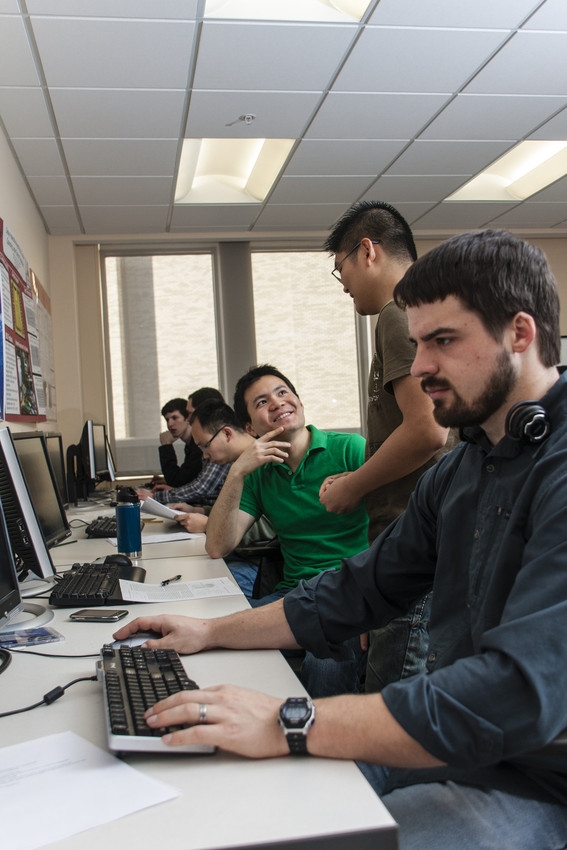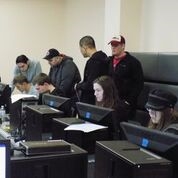
A team of eight students representing the University of Arkansas in cyber security will compete in the Southwest Regional Collegiate Cyber Defense Competition March 23-25 at the University of Tulsa, where they will face seven other teams to defend a simulated commercial business network over the course of two days.
The Cyber Hogs is a team of both undergraduate and graduate students who practice skills such as software coding, application protection, firewalls, system configuration, endpoint security, and network security.
At the beginning of each competition, teams are provided identical computer configurations that simulate a network for a small commercial business. Throughout the competition, professionals "attack" the network and impose cyber security threats that each team must work to solve to protect their network and stay in the competition.
Over 200 colleges and universities across the nation competed earlier this year to qualify for their respective region's competition. Out of the 18 universities that attended the qualifying round for the Southwest Region, the Cyber Hogs was one of eight teams to advance to regionals. The winner from each region will advance to the National Collegiate Cyber Defense Competition.
Andrew Beers, a senior computer engineering major, captains the team. He said the competition has been a valuable opportunity during his college career.
"It's given me a new perspective on systems," Beers said. "What are the actual capabilities? We made a plan based on what we had been reading in a book, and it fell apart in a minute. The question becomes, 'how do you respond?'"
Taylor Kinsey, a sophomore computer science major, said there's no substitute for working in a realistic environment like the one in the competition.
"It's like playing chess alone and then playing against another person," Kinsey said. "You may think you know exactly what to do, but you have no idea what's really out there."
 The Cyber Hogs are led by two faculty sponsors: Dale Thompson, associate professor in the Department of Computer Science and Computer Engineering, and Alan Greenberg, chief information security officer for Information Technology Services. The team meets Wednesdays at 5 p.m. in J.B. Hunt Transport Services Inc. Center for Academic Excellence, and has spent the past months preparing for the competition.
The Cyber Hogs are led by two faculty sponsors: Dale Thompson, associate professor in the Department of Computer Science and Computer Engineering, and Alan Greenberg, chief information security officer for Information Technology Services. The team meets Wednesdays at 5 p.m. in J.B. Hunt Transport Services Inc. Center for Academic Excellence, and has spent the past months preparing for the competition.
The National Collegiate Cyber Defense Competition will be held April 13-15 in San Antonio, Texas. In the past, it has been attended by government officials and executives from commercial contractors who sponsor the event, such as Raytheon, Northrop Grumman, Walmart, and other cyber security contractors. For them, this is a recruiting event featuring some of the best and brightest students in cyber security.
The event is sponsored by the Department of Homeland Security. The goal of these competitions is to provide a controlled, competitive space for college students to apply theoretical and practical skills learned in class, along with a meaningful, interactive mechanism to evaluation those skills. They also foster a spirit of teamwork, ethical behavior and effective communication within and across teams, and create interest and awareness among participating institutions.
Thompson praised the team's ability to work together, noting the victory was the result of months of preparation.
"I am very proud of team," Thompson said. "They have worked hard practicing their skills since last fall preparing for this competition and their hard work has paid off. A successful team requires cooperation under stressful situations and they methodically kept defending the systems."
Greenberg, who has been involved with the College Cyber Defense Competition since 2004, said it's a tremendous opportunity for anyone interested in cyber-security to hone their skills.
"Real hands-on experience is precious in this field, and these students become very employable," he said. "There's a shortage of cyber-security professionals in this country, and when companies find talent they want to build off it."
Greenberg noted involvement with the Cyber Hogs team isn't limited to students majoring in computer science or computer engineering. Some of his strongest students have been from outside the computer science field, because they bring a different perspective, he said.
"You don't have to be a geek to do this," he said. "Even if you're just interested in this kind of work as a hobby, you can participate. But it helps to be a little bit of a geek."
Topics
Contacts
Erin C. Griffin, content strategy/IA specialist
University Information Technology Services
479-575-4588,
Nick DeMoss, director of communications
College of Engineering
479-575-5697,